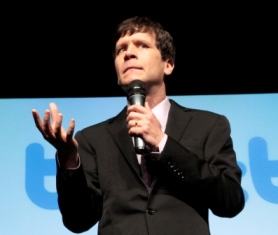

There’s no doubt that the face of the publishing industry is changing, and quite possibly that it has changed more in the last five years than over the entire course of its history. As digital publishing and self-publishing became more the norm rather than an arena relegated to tech geeks or authors who couldn’t find publishing deals, the industry in every facet has had to race to keep up.
But just when the industry finally seemed to settle into a comfortable relationship between traditional print publishing and self- and digital publishing, a whole new model has come along, turning it on its head once more. Net Minds, founded by bestselling author and former Yahoo! executive Tim Sanders, has created a whole new model in which authors have even more control over the process by negotiating for some of the best talent in the book publishing industry to help bring their creations to market.
“We empower authors to meet publishing professionals, create relationships, share royalties, and build great teams that run like start ups,” explained Sanders in an interview with GoodEReader at Tools of Change this week. “Everybody has an incentive beyond the fee and is highly engaged and entrepreneurial with their work.”
Sanders took the concept of solving a problem with a minimum viable model in order to achieve the greatest reach with the least amount of inefficiency, a problem that is prevalent in the publishing industry, especially from the first very stage of acquiring content. This model will have its first real test when Net Minds releases its first title next month, Finding the Next Steve Jobs, by Atari founder Nolan Bushnell.
“The window for success has shortened dramatically,” Sanders said. “”It impacted the ability for me to be a bestseller.”
The process for Net Minds to build a joint venture mission and to work on a model more along the lines of how films are optioned and produced, which allows those involved in the project to earn a portion of their standard fee up front along with a portion of royalties for the life of the project.
“You don’t have to choose between the tyranny of traditional and the anarchy of self-publishing. In the future, they won’t even call it traditional versus self, they’ll call it corporate versus alternative. Our vision is that the author doesn’t have to choose between quality and freedom.”
In order to achieve this goal, Net Minds works with its own vetted list of professionals to assign talent to project teams. While the author is still hiring these professionals for various aspects of book publishing–such as editing, marketing, or cover design, to name a few–the cost to hire these professionals is smaller because they will later earn a portion of the royalties.
Obviously, this model has had its critics. Questions about being picked up by a major traditional publishing house, leaving those professionals without their royalties, have been raised, along with veiled concerns that this is nothing more than a carefully screened list of names that the author must still hire up front.
However the model turns out in the end, it is refreshing that innovators aren’t content to let the digital publishing revolution become stagnant. Events like TOC and start ups like Net Minds will serve to ensure that options are always open for books.
Mercy Pilkington is a Senior Editor for Good e-Reader. She is also the CEO and founder of a hybrid publishing and consulting company.
